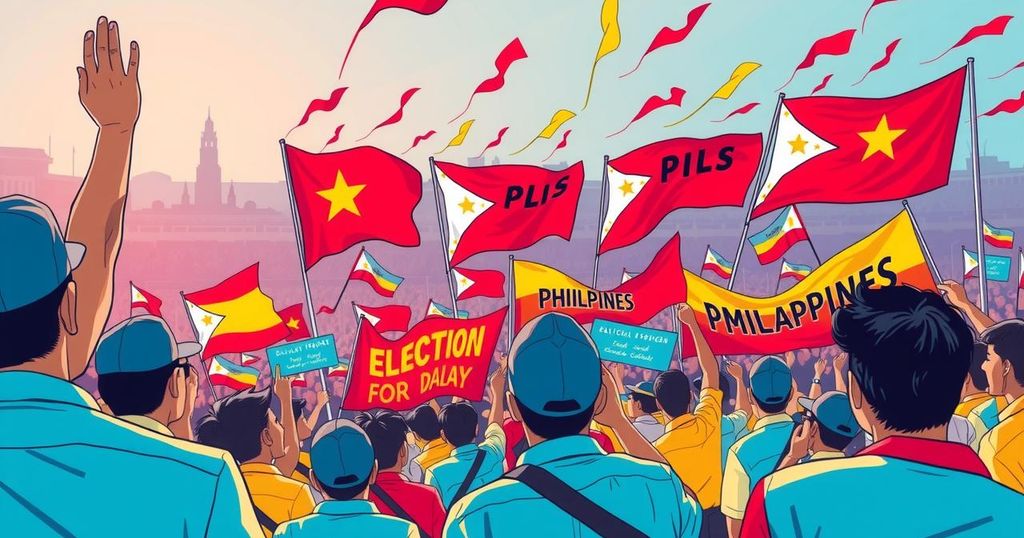On Monday, millions of Filipinos participated in mid-term elections perceived as a referendum on the feud between President Marcos and impeached Vice President Duterte. Key races include 18,000 positions, notably 12 Senate seats, which may affect Duterte’s future. Security concerns are mounting due to pre-election violence, raising alarms about safety on polling day.
Manila (AFP) – Millions of Filipinos turned out for the mid-term election on Monday, which many view as a referendum on the intense rivalry between President Ferdinand Marcos and impeached Vice President Sara Duterte. Polls opened at 7 a.m. (2300 GMT Sunday) across the nation, where over 18,000 positions were up for grabs, from the House of Representatives to local municipal offices. But the spotlight is on the Senate race, crucial for the upcoming 2028 presidential election.
The 12 senators elected will play a pivotal role as half of the jury in a forthcoming impeachment trial for Duterte, scheduled for July. This trial could lead to her permanent disqualification from public office. The feud between Duterte and Marcos erupted earlier this year when the Vice President was impeached for alleged “high crimes” involving corruption and a supposed assassination plot against Marcos.
Compounding matters, just weeks after the impeachment, former President Rodrigo Duterte was arrested and transported to the International Criminal Court (ICC) to face charges of crimes against humanity tied to his controversial anti-drugs campaign. Currently, Sara Duterte is banking on need to secure at least nine votes in the Senate’s 24-seat body to keep her presidential dreams alive.
As of now, Marcos has endorsed seven candidates in the top 12, while four are aligned with his vice president. Interestingly, two candidates—Marco’s sister Imee and TV personality Camille Villar—were recently added to the PDP-Laban party’s list of endorsements. This move seems aimed at strengthening support for Duterte as she faces impeachment.
At her closing rally on Thursday, Duterte stirred controversy by alleging “massive” electoral fraud and called her father’s ICC situation a “kidnapping.” Despite his legal troubles, he’s still on the ballot for a mayoral seat in Davao City, where polls suggest he might win by a wide margin.
Election violence has marred the lead-up to the polls. Just a day prior to the election, clashes between rival political factions in the Bangsamoro Autonomous Region in Mindanao resulted in at least two deaths, though local disaster office estimates suggest four fatalities. The history of political violence in the Philippines, especially in the southern regions, is well-known, with armed clashes frequently erupting.
In response to potential violence, national police heightened security measures, deploying approximately 163,000 officers across polling stations, plus additional military and fire department personnel. Unfortunately, the pre-election environment has already seen violence, resulting in at least 16 fatalities including candidates and polling officers. In one instance, a council candidate was killed in a shootout with law enforcement.
Meanwhile, at Cebu airport, authorities apprehended a group carrying an enormous sum of 441 million pesos (around $8 million), which is against election regulations aimed at preventing vote-buying. In a twist this year, a special early voting period for seniors and those with disabilities began at 5 a.m., offering them additional time to cast their votes without the usual hustle and bustle.
In summary, the mid-term elections in the Philippines this week are underscored by the notable feud between President Marcos and Vice President Duterte, with significant implications for future political landscapes. Amid historical patterns of election-related violence, security measures are ramped up as voters are left navigating a tumultuous political environment. Observers will be closely watching the outcomes, particularly in the Senate, as it could influence Duterte’s potential future aspirations and the overall balance of power directly following these elections.
Original Source: www.rfi.fr






